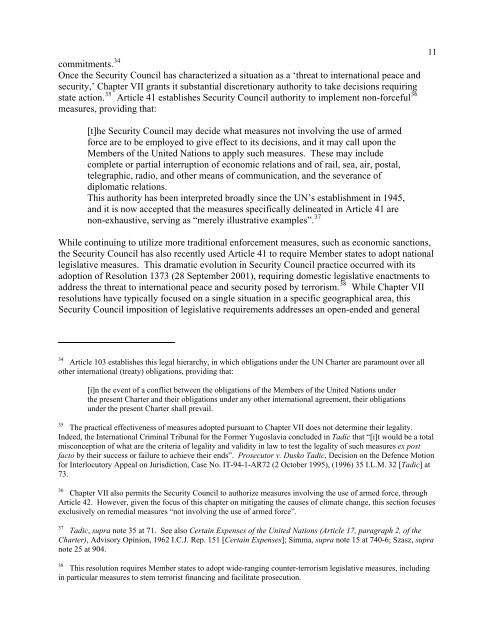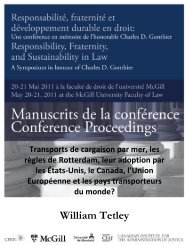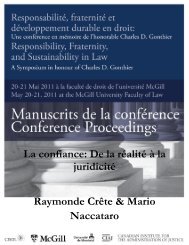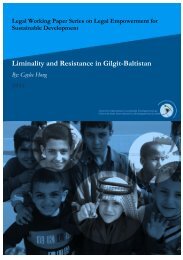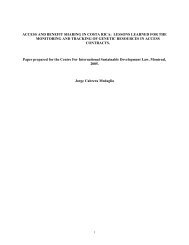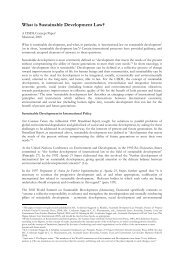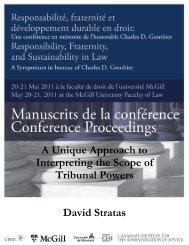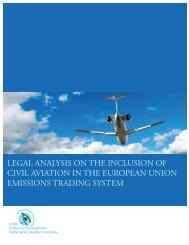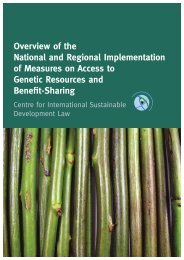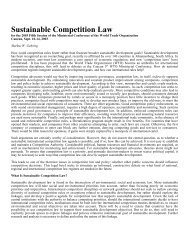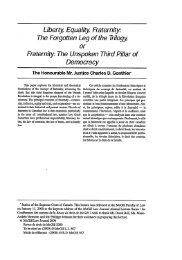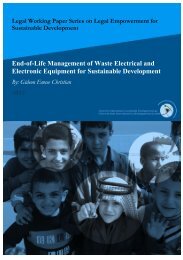Climate Change and the Security Council - CISDL
Climate Change and the Security Council - CISDL
Climate Change and the Security Council - CISDL
You also want an ePaper? Increase the reach of your titles
YUMPU automatically turns print PDFs into web optimized ePapers that Google loves.
commitments. 34<br />
Once <strong>the</strong> <strong>Security</strong> <strong>Council</strong> has characterized a situation as a ‘threat to international peace <strong>and</strong><br />
security,’ Chapter VII grants it substantial discretionary authority to take decisions requiring<br />
state action. 35 Article 41 establishes <strong>Security</strong> <strong>Council</strong> authority to implement non-forceful 36<br />
measures, providing that:<br />
11<br />
[t]he <strong>Security</strong> <strong>Council</strong> may decide what measures not involving <strong>the</strong> use of armed<br />
force are to be employed to give effect to its decisions, <strong>and</strong> it may call upon <strong>the</strong><br />
Members of <strong>the</strong> United Nations to apply such measures. These may include<br />
complete or partial interruption of economic relations <strong>and</strong> of rail, sea, air, postal,<br />
telegraphic, radio, <strong>and</strong> o<strong>the</strong>r means of communication, <strong>and</strong> <strong>the</strong> severance of<br />
diplomatic relations.<br />
This authority has been interpreted broadly since <strong>the</strong> UN’s establishment in 1945,<br />
<strong>and</strong> it is now accepted that <strong>the</strong> measures specifically delineated in Article 41 are<br />
non-exhaustive, serving as “merely illustrative examples”. 37<br />
While continuing to utilize more traditional enforcement measures, such as economic sanctions,<br />
<strong>the</strong> <strong>Security</strong> <strong>Council</strong> has also recently used Article 41 to require Member states to adopt national<br />
legislative measures. This dramatic evolution in <strong>Security</strong> <strong>Council</strong> practice occurred with its<br />
adoption of Resolution 1373 (28 September 2001), requiring domestic legislative enactments to<br />
address <strong>the</strong> threat to international peace <strong>and</strong> security posed by terrorism. 38 While Chapter VII<br />
resolutions have typically focused on a single situation in a specific geographical area, this<br />
<strong>Security</strong> <strong>Council</strong> imposition of legislative requirements addresses an open-ended <strong>and</strong> general<br />
34<br />
Article 103 establishes this legal hierarchy, in which obligations under <strong>the</strong> UN Charter are paramount over all<br />
o<strong>the</strong>r international (treaty) obligations, providing that:<br />
35<br />
[i]n <strong>the</strong> event of a conflict between <strong>the</strong> obligations of <strong>the</strong> Members of <strong>the</strong> United Nations under<br />
<strong>the</strong> present Charter <strong>and</strong> <strong>the</strong>ir obligations under any o<strong>the</strong>r international agreement, <strong>the</strong>ir obligations<br />
under <strong>the</strong> present Charter shall prevail.<br />
The practical effectiveness of measures adopted pursuant to Chapter VII does not determine <strong>the</strong>ir legality.<br />
Indeed, <strong>the</strong> International Criminal Tribunal for <strong>the</strong> Former Yugoslavia concluded in Tadic that “[i]t would be a total<br />
misconception of what are <strong>the</strong> criteria of legality <strong>and</strong> validity in law to test <strong>the</strong> legality of such measures ex post<br />
facto by <strong>the</strong>ir success or failure to achieve <strong>the</strong>ir ends”. Prosecutor v. Dusko Tadic, Decision on <strong>the</strong> Defence Motion<br />
for Interlocutory Appeal on Jurisdiction, Case No. IT-94-1-AR72 (2 October 1995), (1996) 35 I.L.M. 32 [Tadic] at<br />
73.<br />
36<br />
Chapter VII also permits <strong>the</strong> <strong>Security</strong> <strong>Council</strong> to authorize measures involving <strong>the</strong> use of armed force, through<br />
Article 42. However, given <strong>the</strong> focus of this chapter on mitigating <strong>the</strong> causes of climate change, this section focuses<br />
exclusively on remedial measures “not involving <strong>the</strong> use of armed force”.<br />
37<br />
Tadic, supra note 35 at 71. See also Certain Expenses of <strong>the</strong> United Nations (Article 17, paragraph 2, of <strong>the</strong><br />
Charter), Advisory Opinion, 1962 I.C.J. Rep. 151 [Certain Expenses]; Simma, supra note 15 at 740-6; Szasz, supra<br />
note 25 at 904.<br />
38<br />
This resolution requires Member states to adopt wide-ranging counter-terrorism legislative measures, including<br />
in particular measures to stem terrorist financing <strong>and</strong> facilitate prosecution.


